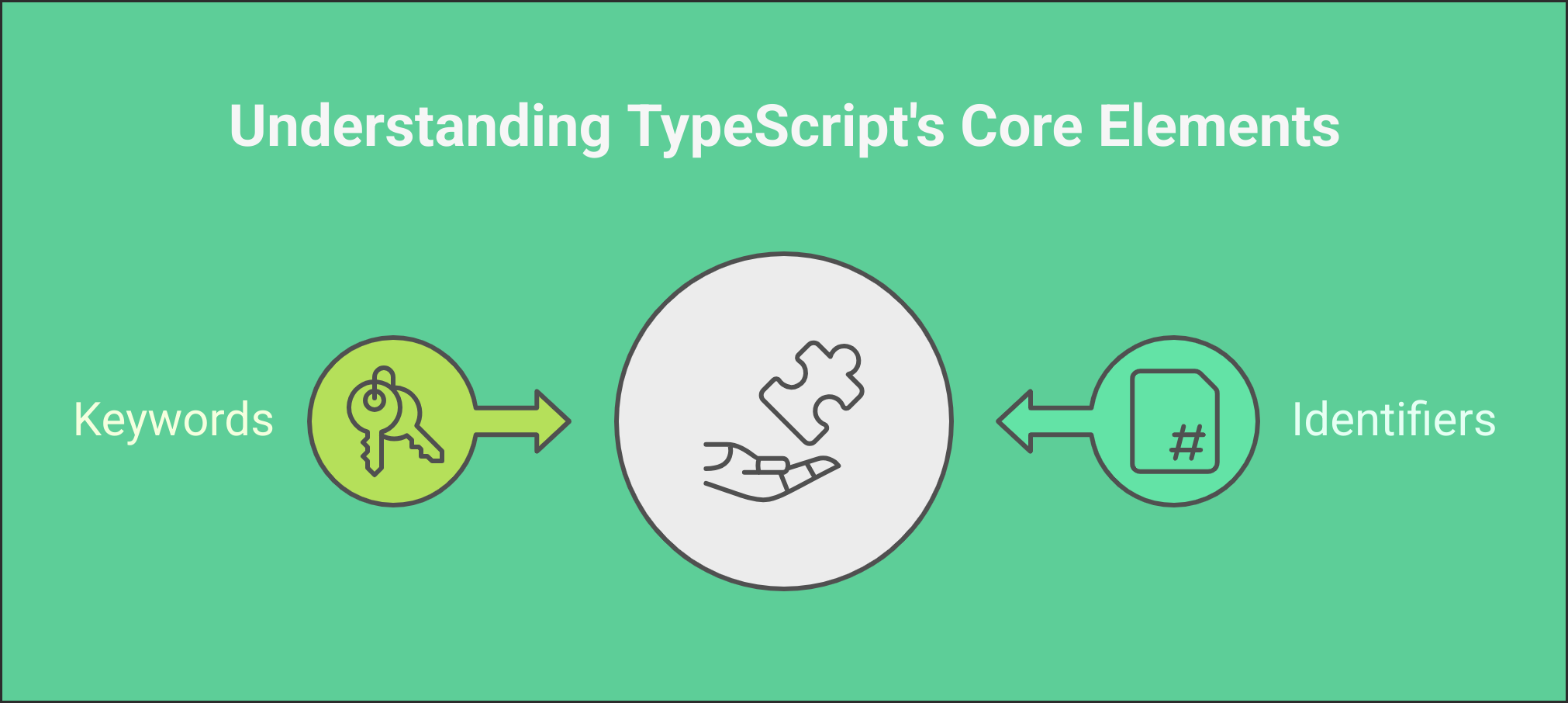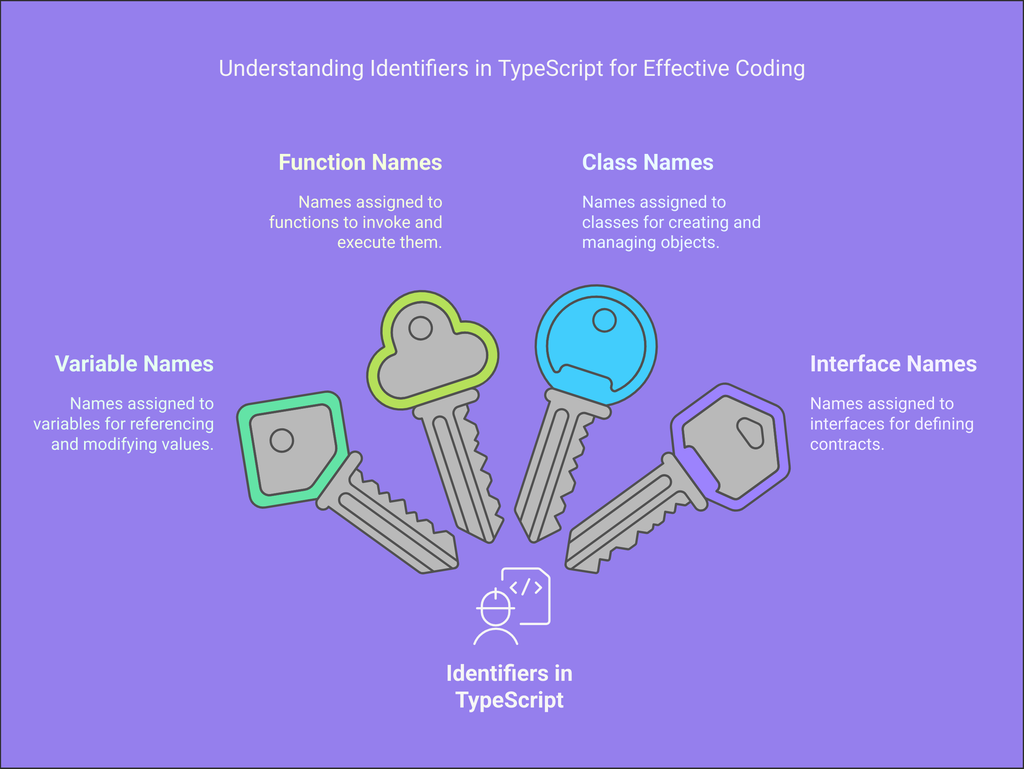Understanding the role of Identifiers & Keywords in Typescript
What is typescript?

TypeScript, an extension of JavaScript, brings a robust type system to web development, making it easier to write maintainable and scalable code. Two fundamental aspects of TypeScript—and indeed any programming language—are identifiers and keywords. Understanding their roles and proper usage is crucial for harnessing the full power of TypeScript.
What are Identifiers?
Identifiers in TypeScript are names given to various program elements, such as variables, functions, classes, and interfaces. They reference these elements, allowing programmers to interact with them throughout their code. Identifiers must adhere to specific naming rules to ensure clarity and avoid conflicts.

Naming Rules for Identifiers
To maintain clarity and avoid conflicts in TypeScript, identifiers must adhere to specific naming rules:
Character Set: Identifiers can consist of letters (both uppercase and lowercase), digits (0-9), underscores (_), and dollar signs ($). However, they cannot start with a digit.
Case Sensitivity: Identifiers are case-sensitive, meaning that
myVariable,MyVariable, andMYVARIABLEare considered different identifiers.Reserved Keywords: Identifiers cannot be the same as reserved keywords in TypeScript, such as
if,else,for,class, etc.Length: While there is no strict limit on the length of identifiers, it is advisable to keep them reasonably short and descriptive for better readability.
Best Practices for Using Identifiers
To enhance code readability and maintainability, consider the following best practices when naming identifiers:
Descriptive Names: Use meaningful names that convey the purpose of the variable or function. For example, instead of using
x, usetotalPricefor a variable that holds the total price of items.
Camel Case: For variables and functions, use camelCase (e.g.,
calculateTotal) to improve readability. For class names, use PascalCase (e.g.,ShoppingCart).
Avoid Abbreviations: Unless widely recognized, avoid using abbreviations that may confuse readers. For instance, prefer
customerAddressovercustAddr.
Consistency: Use consistent naming conventions throughout your codebase to help others (and yourself) understand the code.
Identifiers Examples
Here are a few examples of identifiers in TypeScript, along with their outputs:
Variable Declaration
let userName: string = "Shagun D";
console.log(userName);
// Output
Shagun D Function Declaration
function greetUser(name: string): string {
return `Hello, ${name}!`;
}
console.log(greetUser("Shagun"));
// Output
Hello, Shagun! Class Declaration
class Club {
name: string;
slogan: string;
founded: number;
constructor(name: string, slogan: string, founded: number) {
this.name = name;
this.slogan = slogan;
this.founded = founded;
}
getCarInfo(): string {
return `${this.founded} ${this.name} ${this.slogan}`;
}
}
const myClub = new Club("Real Madrid", "hala madrid y nada mas", 1902);
console.log(myClub.getCarInfo());
// Output
1902 Real Madrid hala madrid y nada mas Interface Declaration
interface Person {
firstName: string;
lastName: string;
age: number;
}
const person: Person = {
firstName: "Shagun",
lastName: "D",
age: 25
};
console.log(`${person.firstName} ${person.lastName}, Age: ${person.age}`);
// Output
Shagun D, Age: 25Enum Declaration
enum Direction {
North,
South,
East,
West
}
let currentDirection: Direction = Direction.North;
console.log(currentDirection); // Enum value
console.log(Direction[currentDirection]); // Enum name
// Output
0
NorthType Alias Declaration
type Point = {
x: number;
y: number;
};
const point: Point = {
x: 10,
y: 20
};
console.log(`Point coordinates: (${point.x}, ${point.y})`);
// Output
Point coordinates: (10, 20)What are Keywords?
Keywords are reserved words in TypeScript that have special meanings and cannot be used as identifiers. They are integral to the language's syntax and structure, guiding the interpreter on how to parse and execute the code. Keywords are predefined and serve specific functions in the language.
.png)
Common TypeScript Keywords
Control Flow:
if,else,switch,case,for,while,do,break,continueDeclarations:
var,let,const,function,class,interface,enum,typeTypes:
number,string,boolean,void,any,never,unknownAccess Control:
public,private,protected,readonlyOthers:
import,export,extends,implements,new,super,this,static,abstract,as,async,await
Using Keywords Effectively
Control Flow: Keywords like
if,else, andswitchare used to create conditional statements, whilefor,while, anddohelp in creating loops. Proper use of these keywords can make the code more efficient and readable.Variable Declarations:
var,let, andconstare used to declare variables, withletandconstbeing block-scoped andvarbeing function-scoped. Understanding the differences and choosing the right keyword for variable declaration is vital for avoiding scope-related issues.Type Declarations: Keywords like
number,string, andbooleanare used to declare the types of variables, ensuring type safety. Using these keywords helps in catching type-related errors during development, leading to more robust code.Access Control:
public,private, andprotectedcontrol the visibility of class members.readonlyensures that a property can only be assigned during initialization or in the constructor, enhancing the security and integrity of the class.Modules and Imports:
importandexportare used for modular programming, allowing developers to split their code into reusable modules. This leads to better organization and maintainability of the codebase.Asynchronous Programming:
asyncandawaitfacilitate asynchronous programming, making it easier to work with promises and asynchronous functions.
Keywords Examples
Here are a few examples of identifiers in Keywords, along with their outputs:
Control Flow
function checkAge(age: number): string {
if (age < 18) {
return "Minor";
} else if (age < 65) {
return "Adult";
} else {
return "Senior";
}
}
console.log(checkAge(25))
// Output
AdultVariable Declaration
let userName: string = "John Doe";
const userAge: number = 30;Type Declaration
function add(a: number, b: number): number {
return a + b;
}Access Control
class Person {
private name: string;
protected age: number;
public readonly id: number;
constructor(name: string, age: number, id: number) {
this.name = name;
this.age = age;
this.id = id;
}
public getName(): string {
return this.name;
}
}
Modules and Imports
// math.ts
export function add(a: number, b: number): number {
return a + b;
}
// app.ts
import { add } from './math';
console.log(add(2, 3));
// Output
5Asynchronous Programming
async function fetchData(url: string): Promise<any> {
const response = await fetch(url);
return response.json();
}
fetchData('https://api.example.com/data')
.then(data => console.log(data))
.catch(error => console.error(error));Conclusion
Understanding the role of identifiers and keywords in TypeScript is fundamental to writing clean, efficient, and maintainable code. Identifiers provide a way to name and reference various elements in your code, while keywords form the backbone of the language’s syntax and structure. By following best practices for naming identifiers and effectively using keywords, developers can leverage TypeScript to its full potential, resulting in more robust and error-free applications.
Staying current with TypeScript’s evolving features and incorporating them into your projects ensures that you remain at the forefront of modern web development. Whether you're declaring variables, creating classes, or managing control flow, a deep comprehension of these core concepts will significantly enhance your coding experience. Happy coding!
